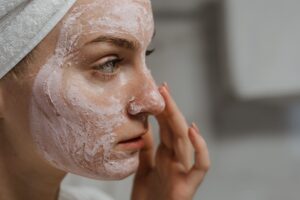Are They Worth the Hype?

Silicones are a popular ingredient found in many cosmetic products, ranging from haircare to skincare. They are used to improve the texture, spreadability, and overall performance of products. However, the use of silicones has been a topic of debate within the beauty industry. Some praise the benefits of silicones, while others criticize their potential drawbacks. In this blog post, we will explore the pros and cons of silicones in cosmetics.
Pros of Silicones in Cosmetics
Improved Texture
One of the main advantages of silicones is their ability to improve the texture of cosmetic products. They provide a silky smooth finish, making products easier to apply and spread. This is particularly important in skincare products, as it allows for better absorption and penetration into the skin.
Moisturizing
Silicones also have moisturizing properties, which can be beneficial for those with dry or dehydrated skin. They form a barrier on the skin’s surface, preventing water loss and keeping the skin hydrated. This is why silicones are commonly found in moisturizers, serums, and other hydrating skincare products.
Protection
Silicones can also provide a protective barrier for the skin. They create a barrier that can help shield the skin from environmental aggressors such as pollution, UV rays, and free radicals. This is why many sunscreens and anti-aging products contain silicones.
Long-lasting
Another benefit of silicones is their ability to make cosmetic products last longer. They can help prevent products from breaking down or evaporating, which can improve their longevity. This is particularly important in makeup products, as it allows for longer wear time and fewer touch-ups.
Cons of Silicones in Cosmetics
Non-Biodegradable
One of the biggest criticisms of silicones is that they are not biodegradable. This means that they do not break down in the environment and can contribute to pollution. This is why some people are wary of using products that contain silicones, as they may have negative impacts on the environment.
Clogging Pores
Silicones can also clog pores, leading to breakouts and other skin issues. This is particularly true for those with acne-prone or sensitive skin. Silicones can create a barrier on the skin’s surface, trapping oil and dirt in the pores and leading to inflammation and breakouts.
Difficulty Removing
Another potential issue with silicones is that they can be difficult to remove from the skin. This can be problematic, as it can lead to a buildup of product on the skin’s surface. Over time, this can lead to dullness, uneven texture, and other skin issues.
Masking Effect
Finally, some people criticize silicones for their “masking effect.” This means that they can create the illusion of smoother, more even-toned skin, but may not actually address the underlying issues. This is particularly true for silicone-based primers and other products that claim to smooth out the skin’s texture and appearance.
Conclusion
In conclusion, silicones have both pros and cons when it comes to their use in cosmetics. While they can provide a silky texture, moisturizing properties, and protection for the skin, they can also clog pores, be difficult to remove, and contribute to environmental pollution. Ultimately, whether or not you choose to use products that contain silicones is a personal decision that depends on your skin type, concerns, and values. If you are concerned about the potential drawbacks of silicones, consider opting for products that are silicone-free or contain minimal amounts of silicone. As with any skincare or beauty product, it is important to do your research and make an informed decision based on your individual needs and preferences.

